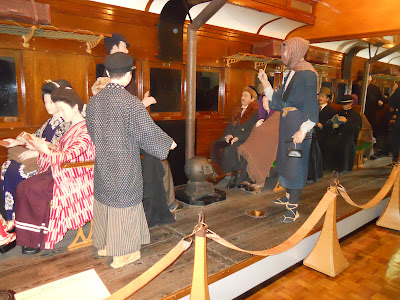(This is my second series of posts in this blog concerning travels
around Japan. For the first, on Hiroshima, Nagano and Nikko in
Dec-Jan 2011-2, click here, and see the January 2012 archive for the full series.)
As the mounting heat and humidity of summer slowly turns Tokyo into
an insufferable people-oven, the time is ideal to make haste for the
cooler, fresher climes of the north.
This two-week voyage, on local trains as the previous one, led in the
opposite direction in more than geographical terms. Tōhoku,
the northern region of Japan's main island of Honshu, has a
reputation for being rural, remote, and – unfortunately – the
leading victim of the March 2011 Triple Disaster, when the
earth's unrest, the rage of the sea, and the sordid incompetence of
politicians and the energy industry over the Fukushima nuclear plant
wrought devastation.
My expedition began on the other
side of Tōhoku,
up the region's western flank via the rice fields of Akita. Only
later did it conclude in the east around intensely history-conscious
Sendai and the prefecture of Miyagi, whose tsunami-stricken coast was
among the worst to suffer.
The real goal of my voyage,
however, was the northern island of Hokkaido. For so long Japan's
wild frontier, virtually Siberian, and only really absorbed into
Japanese society over the last hundred and fifty years, Hokkaido's
distinct and exotic experience still exerts a strong lure today.
So it was that my trail led
through the prefectural capital of Sapporo, the beautiful farms and
fields of Furano, the city of Asahikawa beneath the glorious
Daisetsuzan national park, and the great historical port of Hakodate.
In each I found remarkable reflections of Hokkaido's unique story, so
distinct from that of Japan as a whole but irrevocably intertwined
with its Japanese colonization – and so too, in a breathtaking
blend, with the influences of foreigners; the heritage of its
original Ainu inhabitants; and of course, the vast untameable nature
and climate which, though merciless in its wrath, is what has made
Hokkaido so bold as a challenge and spectacular as a land.
Having returned to Tokyo, I shall
be documenting and reflecting on the huge range of things –
experiences, discoveries, tales – this voyage imparted, right here
in this blog. Their magnitude means that I will require no fewer than
ten posts to cover it all,
which I will add here progressively over the coming days and weeks.
I hope these will be as exciting
to read about as they were for me to witness, or in some cases
partake in. They include some of Japan's more bizarre examples of
deep traditional culture...
...consideration for Hokkaido's
indigenous people, the Ainu, and their long struggle with contempt
and mistreatment like most of the world's indigenous peoples have had
to endure...
...perspectives on the joys and
sorrows, courage and fears, heroes and villains, triumphs and
tragedies that mark Hokkaido's distinctive historical journey...
...and of course, the roaring
essence of Hokkaido: its nature. Thundering, wild, unconquerable,
that which was there before us humans and which we can never
overcome, but only respect, make peace with, and enjoy, with
admiration and awe, for the awesome privilege by which it lets us
make our homes in its presence.
The winds of the north are
blowing this way, and bring remarkable things. Watch this space –
it begins, very soon!
Posts in this series:
1) AKITA - Legends of the Namahage (秋田 の なまはげ)
2) SAPPORO – The Story of Hokkaido (北海道 の ものがたり)
3) SHIRAOI – Return of the Ainu (アイヌ)
4) FURANO – Flowers and Farms (富良野)
5) KURODAKE – The Pinnacle (黒岳)
6) ASAHIKAWA – More Fuzzy Animals (旭川: 可愛い 動物!)
7) HAKODATE – Beginnings and Ends (函館)
8) NARUKO – Kokeshi Road (鳴子のこけし)
9) SENDAI – Its Rise, Fall, Rise, Fall and Rise (仙台)
10) MATSUSHIMA – The Aftermath (松島)
Posts in this series:
1) AKITA - Legends of the Namahage (秋田 の なまはげ)
2) SAPPORO – The Story of Hokkaido (北海道 の ものがたり)
3) SHIRAOI – Return of the Ainu (アイヌ)
4) FURANO – Flowers and Farms (富良野)
5) KURODAKE – The Pinnacle (黒岳)
6) ASAHIKAWA – More Fuzzy Animals (旭川: 可愛い 動物!)
7) HAKODATE – Beginnings and Ends (函館)
8) NARUKO – Kokeshi Road (鳴子のこけし)
9) SENDAI – Its Rise, Fall, Rise, Fall and Rise (仙台)
10) MATSUSHIMA – The Aftermath (松島)




















No comments:
Post a Comment